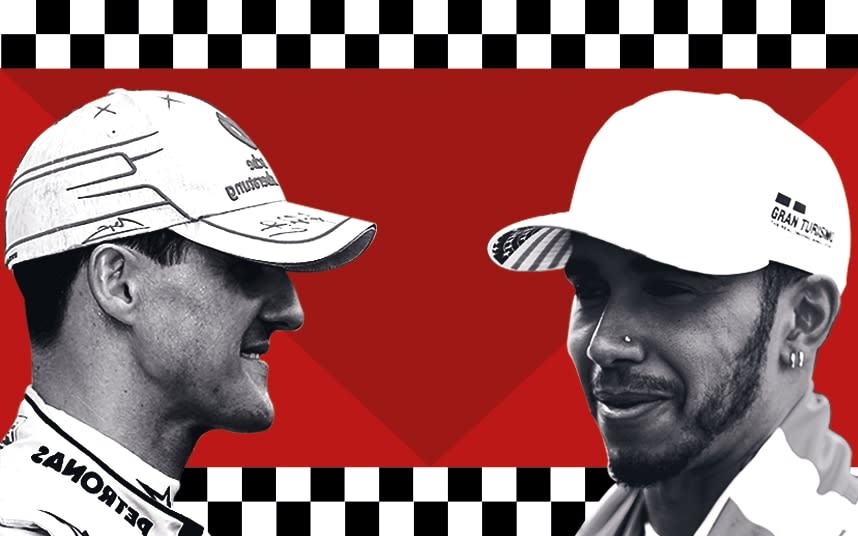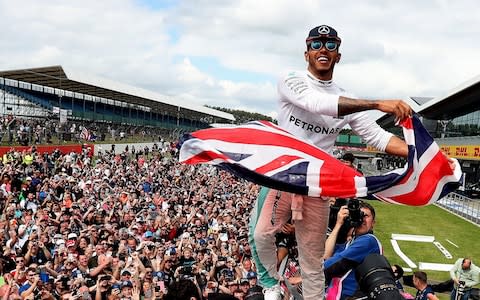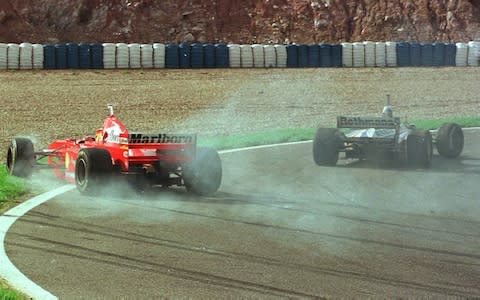After a sixth world title, should Lewis Hamilton be considered greater than seven-time winner Michael Schumacher?

There is little doubt that Lewis Hamilton stands amongst Formula One's all time greats. After achieving his sixth world title at the United States Grand Prix he is now within touching distance of reaching the loftiest of the sport's records and toppling Michael Schumacher's seven world drivers' championships and 91 Grand Prix victories.
The debate of F1's greatest driver of all time has no clear answer. Schumacher is statistically the greatest but the conversation should extend beyond that. Comparing drivers in different eras is nearly impossible.
Juan Manuel Fangio started 51 Grands Prix and won 24, and with it five world titles, the last at 46 years of age. But times were vastly different then. Schumacher is statistically the greatest but the conversation should extend beyond that.
Schumacher vs Hamilton, though, is an easier job. Both have raced in roughly the same era and have some striking similarities in their records.
Is there an argument that Hamilton has elevated himself above the German already? We take a look at the headline numbers, go deep into the data and consider the more intangible arguments.
The headline numbers
For some, Hamilton won't have a claim to being better than Schumacher until he surpasses all of the German's milestones. His record of seven world titles and 91 race wins has stood for 15 years. It seemed difficult to imagine that anyone would come close to matching such a monumental feat so soon but Hamilton is nearly there at only 34 and is still getting better.
For an accurate comparison, though, I would argue that it's necessary to discount Schumacher's three years at Mercedes from 2010-2012 as this skews some of his statistics. Although he was hardly an embarrassment he was clearly a different driver and a long way from his peak. Greatness should be measured at a prolonged peak.
Handily, Schumacher competed in 249 Grands Prix before his return and Hamilton has now featured in 248. This makes the comparison neat and pertinent.

Hamilton has now won his sixth title in his 13th season. Schumacher won his seventh in his 13th full season and finished with that number after 15. Not much to choose between them so far.
In race wins, Schumacher has 91 to Hamilton's 83. The German won around 30 per cent of the races he entered whilst Hamilton has won 34 per cent. Take out Schumacher post-2009, though, and that rises to nearly 37 per cent. Neither is clearly ahead on this metric.
In qualifying, Hamilton has a clear advantage. In the modern era he rivals Ayrton Senna as the best driver over one-lap. His 87 pole positions to the German's 68 gives him a clear lead and he's well ahead in percentage terms as well: 35.22 to 27.22, excluding Schumacher's comeback.
Podiums are not really a brilliant metric for true greatness as they generally are just repeats of race wins but on a larger scale and are less important for drivers who have consistently driven race-winning cars but Hamilton is on 150 to Schumacher's 155 (154 before 2007).
Verdict: Too close to call on these numbers alone
Behind the numbers

You cannot make a truly accurate or fair comparison between drivers' successes unless you consider the strength of their machinery and look at what they achieved when the car was up to it and also when it wasn't. While the headline numbers are broadly similar, here there is more nuance.
To measure a car's strength over the course of a season we have used the percentage of the total available points a team scored. To keep comparisons equal, we have used the 2010-2018 points scoring system for all applicable seasons. For example, in 2018 the total points available to a team was 903 (21 races times 43). Mercedes that year scored 655 points or 76.1 of the total available to them. Of course, the quality of a driver directly affects this measure but over a longer period of time it is a reasonable measure of a car's quality.
As brilliant as he is, there is no driver in the 21st century who has driven in machinery as good and as often as Hamilton. His cars have scored on average 65 per cent of the total available points. Schumacher's cars (from 1992-2006) are rated at 56.3 per cent. Hamilton's 83 wins and six titles have come with a little more help from his car, then.
Looking at their periods of dominance, the Mercedes cars Hamilton has driven from 2014 have been further ahead of its rivals than Schumacher's Ferraris. In those seasons, the average percentage of total maximum points Ferrari scored was 73.2, with peaks of 82.5 and 82 in 2001 and 2004.

Over Hamilton's five victorious years at Mercedes this figure is 82 per cent on average, with a peaks of 85.8 and 86.1 in 2014 and 2015. The Briton has had to fight more in the last three seasons as Mercedes' advantage has been eroded but the overall strength of Mercedes beats the 2000-2004 Ferrari fairly comfortably. That does not prove that the title wins were easier but it certainly makes it (and race wins) more likely.
The differences go a little further: in 2001, 2002 and 2004 Ferrari were miles ahead of their rivals but with Rubens Barrichello a firm number two in the team, Schumacher had no real challenger. Showing up was enough most weekends as he won 33 of 52 races in those seasons. That was not the case in 2000, as he fought off Mika Hakkinen for his third title and in 2003 when Juan Pablo Montoya and Kimi Raikkonen came close to beating him. On balance, though, Hamilton's competition has been a bit stiffer.

Performances when times were tougher also give an indication of a driver's greatness. Both have achieved remarkable things in F1. They both won their first championships in a car that did not win the constructors' title. In the last 30 years this has been achieved on one other occasion.
It is also worth considering that they both moved to relatively unfavoured teams and helped turn them into the sport's superpowers. This did not happen by accident. Few others have been able to do this. Both were also fantastic wet-weather drivers.
I would argue on the whole, that Schumacher achieved marginally better results in sub-standard machinery. In 1994 he won the championship, albeit controversially, in a car that scored just 43 per cent of the total available points, winning eight of the 10 races he finished. Since 1990, nobody has won a title in a less competitive car.
He did this despite missing two rounds due to a (deserved) ban for not serving a stop/go penalty and being disqualified in another two. In 1997, too, he sustained a prolonged challenge in a Ferrari that was far worse than the leading Williams. It was another season that ended in controversy but more on Schumacher's indiscretions shortly.

Hamilton's most remarkable achievement was his first title at McLaren (or was it nearly winning it and beating Fernando Alonso in his debut season?) as he triumphed in a car that scored just 49 per cent of the total available points. This is the second-lowest rating since 1990. Although Hamilton has dominated in a dominant car in recent years, he regularly found a way to win when the odds were against him.
In 2009 he won two races in a McLaren that he described as "a dog". That year the team finished a distant third, with fewer than half the points of Red Bull or Brawn. Schumacher perhaps never drove a full season in a car quite that bad statistically, but it's comparable to his three wins for Ferrari in 1996.
On this metric, I think Schumacher just edges it. He managed title challenges in 1997 and 1998 (and would have done in 1999 but for missing half the season after breaking his leg at the British GP) in cars that were not quite up to it. Hamilton, in similar circumstances, won 13 races in five seasons, but never finished higher than fourth in the final standings.
Verdict: Both brilliant in whatever car you put them in but Hamilton has had a little more help from his machinery and Schumacher's feats in sub-par cars are just a little better
The intangible factors: Style and sportsmanship
Being the greatest is more than just about numbers. To be considered you need something more. How you win your races and titles matters. Let's say this up front. Michael Schumacher cannot even begin to compare to Lewis Hamilton here. Schumacher consistently crossed the line more than any great driver other than Ayrton Senna.
Schumacher got away with driving into Damon Hill in Adelaide in 1994's final race, but doing the same three years later to Jacques Villeneuve saw him excluded from the final standings. In his later years for Ferrari he didn't have to resort to underhand tactics so often but parking his car in qualifying in Monaco in 2006, in order to cause a red flag and stop Alonso claiming pole was another instance. Even in his F1 return Schumacher didn't mellow, almost driving his former team-mate Barrichello into the pit wall in Hungary in 2010.

Hamilton has engaged in little of this, bar tweeting what he thought was Jenson Button's telemetry at the Belgian Grand Prix in 2012 (it was actually from the simulator). In fact, he has had to overcome it from others. Nico Rosberg's gamesmanship peaked in 2016 and Alonso nearly caused a full-on mutiny at McLaren in 2007 when he thought Hamilton was being favoured. Hamilton has done nothing of the kind, his speed and consistency being enough.
Hamilton's personality is, euphemistically, "not everyone's cup of tea" but, again, is in another league compared to the robotic metronomic winning machine of Schumacher. When he retired in 2006 it felt like it was the right time and the best thing for F1. Despite Hamilton's post-2013 dominance, the sport still needs him. It would feel worse off without him, even if he were to match Schumacher's records in 2020.
Verdict: Hamilton by an absolute mile
The final verdict

There is a lot to consider here and little to choose between these two. When they were not beating their team-mates in the quickest car (Hamilton has been beaten just twice by the sister car and before 2010, Schumacher was never beaten), they were out-performing their machinery in struggling cars. Both, too, have been able to adapt their style to drive around a car's problems, another mark of greatness.
The separating factor has to be the overall quality of the machinery. Both men have contested 248 grands prix but Schumacher comes out on most metrics here apart from pole positions. Schumacher too performed better in less competitive cars and Hamilton has had the better cars on average over the course of his career. That has to count. At the moment, it is still Michael Schumacher who comes out as the best F1 driver.
Hamilton, though, is the better champion. Schumacher's career comes with too many black marks to be considered "greater" than Hamilton or the best of all time. There have been few better representatives of the sport than Hamilton in the last two decades on and off the track. The significance of being F1's first black driver and champion should not be forgotten, either. With any luck the Briton will surpass Schumacher's records in the next couple of years.

 Yahoo Sport
Yahoo Sport 





































